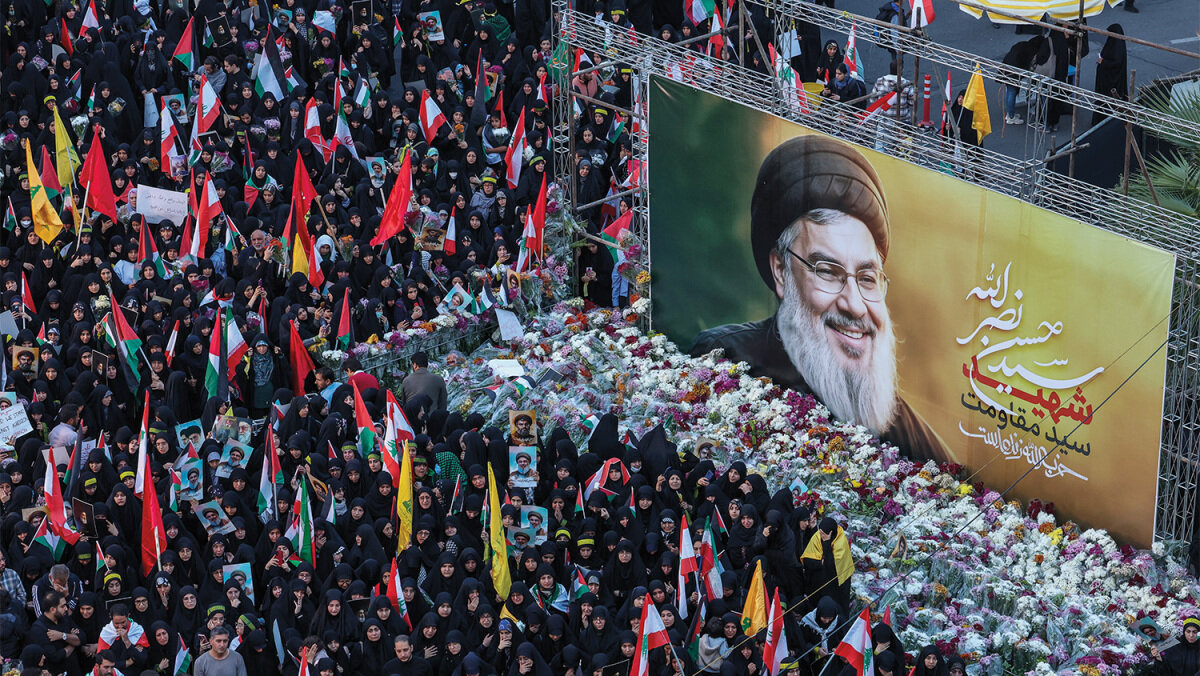Hezbollah’s Days Are Numbered

Hezbollah’s Days Are Numbered
The gloves are off. After almost a year of dealing with Hezbollah’s constant bombardment of the north that forced 60,000 Israelis to evacuate south as refugees, after months of threatening to go into Lebanon and take out Hezbollah once and for all, Israel finally acted—and it acted fast. In short order, Israel nullified most of the threat posed by what some analysts consider the world’s most heavily armed non-sovereign military. Iran’s favored proxy, Hezbollah quickly found itself backpedaling for its own survival.
In the coming weeks and months, Israel may give Lebanon its biggest geopolitical turning point in decades and actually remove Hezbollah from Lebanon once and for all.
Decapitating Hezbollah
Hezbollah Secretary-General Hassan Nasrallah anticipated war with Israel. To avoid internal messages getting intercepted by Israelis, he instructed Hezbollah members to abandon smartphones and switch to lower-tech alternatives like pagers, which are harder to hack. But Israel preempted Nasrallah and somehow infiltrated the supply line for those devices: Israeli agents laced these pagers’ batteries with an explosive substance. Some accounts suggest this could have taken years of planning, including the use of multiple front companies, to accomplish.
On September 17, thousands of those pagers exploded, injuring over 2,700 people and killing at least 12. The next day, exploding walkie-talkies injured at least 450 people and killed 27.
This put Hezbollah in a panic. If something as seemingly mundane as an order of pagers can be infiltrated by Israel’s Mossad and used as a weapon, what else has Mossad booby-trapped? If Hezbollah members can’t use even these technologies, how can they communicate?
On September 20, the heads of the Radwan Force, an elite Hezbollah’ unit, held a meeting in Beirut, Lebanon. This included Ibrahim Aqil, the force’s leader. Israel used the opportunity to advance its attacks a step further. Having discovered the location and time of the meeting, Israeli warplanes bombed the building, killing Aqil and nine other Radwan Force leaders.
On September 25, Israel launched preemptive strikes on storage locations for rockets and missiles (some of which were found to be in civilian homes), as well as launch sites. The Israel Defense Forces said they hit more than 2,000 targets, including almost 70 intelligence centers. The strikes are estimated to have destroyed up to half of Hezbollah’s arsenal of roughly 150,000 projectiles.
Nasrallah vowed retaliation. But he wouldn’t live to see it.
On September 27, after many top Hezbollah leaders were already gone, Israeli Prime Minister Benjamin Netanyahu gave a speech at the United Nations in New York City.
“I have a message for the tyrants of Tehran,” Netanyahu said in his speech. “If you strike us, we will strike you. There is no place in Iran that the long arm of Israel cannot reach. And that’s true of the entire Middle East.”
It turned out that Netanyahu’s speech in New York was a smokescreen to give Nasrallah a false sense of security. The Hezbollah leader was reportedly watching that speech on television inside the Hezbollah headquarters bunker when Israeli warplanes released bunker-busting bombs overhead. Netanyahu’s threat may have been the last thing Hassan Nasrallah ever saw.
On September 30, Israeli soldiers entered Lebanon on small-scale raids to gather intelligence for the main push. The next day, the Israel Defense Forces launched Operation Northern Arrows and commenced the ground invasion. The idf described them as “limited, localized and targeted raids” along the border region. The immediate goal: Neutralize targets that pose “an immediate threat” to Israel’s north.
Israel has implied Operation Northern Arrows is focused on destroying Hezbollah’s infrastructure that directly and immediately threatens northern Israel. But Israel has taken out almost all of Hezbollah’s command structure, including Nasrallah. It has disrupted Hezbollah’s communications networks to the point that the terrorist group is afraid of using rudimentary technology. What is to stop the idf from marching to Beirut and uprooting Hezbollah for good?
Iran Lies Low
The big obstacle is Hezbollah’s sponsor, Iran. But Iran appears to be dragging its feet. Supreme Leader Ayatollah Ali Khamenei has stated that Hezbollah, not Iran, would exact vengeance.
According to Iranian officials speaking to the New York Times, “Ayatollah Khamenei had been deeply shaken by his friend’s death and was in mourning but had assumed a calm and pragmatic posture.” His announcement that Hezbollah would retaliate rather than Iran itself “was a striking sign, some analysts said, that Ayatollah Khamenei may have no way to respond effectively at the moment to Israel’s onslaught on his proxies. Faced with a choice between all-out war with Israel or lying low in the interest of self-preservation, he appears to be choosing the latter.”
Former Iranian Vice President Mohammad Ali Abtahi said on Iranian media: “This was an incredibly heavy blow, and realistically speaking, we have no clear path for recovering from this loss. We will not go to war, that’s off the table. But Iran will also not reverse course in supporting the militant groups in the region, nor in defusing tensions with the West. All of these things can be pursued at the same time.”
Immediately after Nasrallah’s assassination—which followed its killing of Hamas leader Ismail Haniyeh in July—Khamenei went into hiding in a safe house. Apparently, the Iranian regime knows that its supreme leader could be the next target, and they are not confident that they can protect him without taking drastic measures.
Iran did launch almost 200 ballistic missiles against Israel on October 1 to avenge Nasrallah and Hezbollah. But this was fewer than the 300-plus projectiles it sent Israel’s way in April to avenge the killing of an Iranian general. Nasrallah was a much more important figure than was the general, so the quantity of missiles used in the October 1 strike—and the knowledge that Israeli missile defense systems would intercept many of them—suggests halfheartedness on Iran’s part.
Much remains to be seen, but the implication is that, at least as of this writing, the Iranians are wanting to basically sit this fight out.
Hezbollah is leaderless. Its communications are destroyed. Iran has announced it will not directly join the fight. Israel is poised to go deep into Lebanon and finish the job.
Hezbollah is facing the perfect storm to cause its undoing.
Regional Shift Prophesied
The Middle East is an infamously volatile region. By the time you read this, the situation on the ground could be very different. However, there are general trends to watch for that the Trumpet stands by. Bible prophecy informs the Trumpet’s expectations.
Psalm 83 is a prophecy of a group of Middle Eastern nations allying themselves with Germany and the European Union. Verse 7 mentions Gebal and Tyre, cities that still exist in Lebanon today. Because of this, we expect Lebanon to become allied with Europe. Daniel 11:40 describes a German-led Europe, under the prophetic name “the king of the north,” going to war against Iran and its allies (“the king of the south”). We have Trends articles on our website explaining both these prophecies in detail (theTrumpet.com/16032 and theTrumpet.com/15726).
Daniel 11:41 states that this fight will be over the “glorious land”—the land of Israel today. Iran won’t relinquish its goal to annihilate Israel. Verses 42-43 reveal interesting details. It lists Iran’s allies against Europe, including Egypt, Libya and Ethiopia.
All of these nations are to the south and west of Israel. That is not where Iran is focusing its attention right now. Libya and Ethiopia are dysfunctional messes, and Egypt has a peace treaty with Israel. Until now, Iran’s main point of attack against Israel has been to the north—through Lebanon, as well as through Syria. (Psalm 83:6 also lists Syria—under the name of its ancient populace, the Hagarenes—as an ally of Germany.)

But by the time Psalm 83 and Daniel 11 begin to be fulfilled, Iran will hardly have a presence in the north and will have shifted its focus to Israel’s south. Something is going to cause Iran to change strategy.
Syria and Lebanon are both part of Iran’s bloc right now. Bible prophecy says they will ally with Germany against Iran. “Losing Syria will be devastating to Iran,” Trumpet editor in chief Gerald Flurry wrote in the August issue. “It could very well be part of the reason for Iran to violently push at Europe. We don’t know all the details yet, but we need to watch this key Bible prophecy closely” (theTrumpet.com/29734). He wrote in the October 2020 issue: “Psalm 83 … shows that Hezbollah will forfeit much of its power and that Iran will lose its grip over Lebanon—that the nation will instead ally with Saudi Arabia and other moderate Arab states, along with German-led Europe” (theTrumpet.com/22811).
Daniel 11:41 specifies the king of the north “shall enter also into the glorious land.” “They ‘enter’ into the glorious land, or the Holy Land,” Mr. Flurry writes in The King of the South. “The Hebrew indicates this is a peaceful entry—not forced. The Jews appear to invite them in as peacekeepers. After war explodes in the Middle East, there will probably be a thunderous call for a peacekeeper in Jerusalem.”
Germany will be the power behind Lebanon and Syria by this point. The implication is, Israel no longer sees Lebanon and Syria as threats. Could this be because Israel will have a hand in installing the countries’ new governments? Or because they believe a European ally has the situation there under control?
Putting these prophecies together, we expect Lebanon to leave Iran’s orbit. The most likely route is for Hezbollah, Tehran’s lapdog, to be forced out of power. Hezbollah has never been more vulnerable than right now.
Whether it’s the Israelis, Europeans, Lebanese opposition or somebody else who will fire the opening shots, one thing is clear: The days of Iran controlling Lebanon are numbered.
What is Lebanon’s future? To find out, order your free copy of The King of the South.
The Prophet Daniel wrote about a future confrontation between the king of the north and the king of the south. We are now in the time when these two major powers are quickly rising! The king of the south is stirring up trouble even today. It is critical that you know the identity of this prophesied power!

